Reliably Characterize Indoor Photovoltaic Devices
Fast and consistent indoor and outdoor PV testing
Overview | Specifications | Features | Gallery | Software | In the Box | Resources and Support
Easily replicate the spectral output for testing indoor photovoltaic devices. With the light filter, the system meets the specifications required for the IEC TS 62607-7-2:2023 international standard. At two different illuminance levels, you can achieve class ABSA illumination over a 20 mm diameter area.
For ultimate flexbility with a single system, switch to outdoor solar cell testing by removing the detachable light filter.
Indoor Spectral Output
Reliable indoor PV testing
Long Lifetime
10,000 operating hours
Minimal Warm-Up Time
Ready to measure in seconds
Spectral Tunability
Independent LED control
Specifications
Indoor Light Filter
| Spectral Coincidence | A |
|---|---|
| Spatial Uniformity (over 20 mm diameter area) | B |
| Spatial Uniformity (over 25 mm diameter area) | C |
| Temporal Instability | SA |
| Illuminance Levels | 1000 lx, 200 lx |
| Dimensions | 14 cm x 12 cm x 2 cm |
| Weight | 70 g |
LED Lamp
| Type | LED-Based, Steady State |
|---|---|
| Spectral Deviation | <70% |
| Spectral Coverage | >80% |
| Working Distance | 8.5 cm (3.35") |
| Irradiance (at working distance) | 1000 W/m2 |
| Maximum Lamp Time | 10000 hours |
| Lamp Dimensions (L x W x H) | 10.5 cm x 9.0 cm x 8.0 cm (4.13" x 3.54" x 3.15") |
| Weight | 600 g (1.32 lbs) |
Classification for Indoor PV Testing
The Ossila Indoor Light Simulator can achieve up to ABA classification standards over a 20 mm area. This is perfect for testing small area devices, and ideal if you already use our 20 mm x 15 mm substrates. The Ossila Solar Simulator also delivers class ACA illumination over a larger area (25mm diameter). This is suitable for testing large area devices which can be made on our 25 mm x 25 mm substrate systems. We individually calibrate each system with a NIST traceable photo radiometer and include a performance report with each unit.
Spectral Irradiance
These are spectral distribution graphs for the Ossila Indoor Light Simulator at two different illuminances (1000 lux and 200 lux). These illuminance levels are described in the IEC Standards and overall illuminance of this light source matches these values within a 5% error. This should enable indoor PV testing to a standard of A spectral coincidence.
Spatial Uniformity
Light simulators should distribute light evenly across a sample. The spatial uniformity rating demonstrates how uniform a light simulator's distribution is.
At 1000 lx, the Ossila Indoor Light Simulator achieves a spatial non-uniformity class B rating over a 20 mm diameter, making it ideal for testing small area devices. It can also achieves a class C rating over 25 mm diameter.
Temporal Instability
Temporal instability measurements assess the output consistency of solar or indoor light simulators. High temporal stability means the light output from the simulator is stable over a long time.
Here, we demonstrate that you can achieve consistent light output from our simulators, which is required for testing any devices including indoor PV. This should help you achieve classification SA Temporal Stability for your indoor PV measurements.
Documentation
Example calibration certificate
Indoor Light Simulator Features

Indoor Light Filter
Achieve class ABA illumination over a 20 mm diameter area at two different illuminance levels. Simply attach the filter to your Ossila Solar Simulator and set the indoor illumination level using the Solar Simulator Console software.
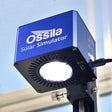
High-Performance LED Lamp
The Ossila Indoor Light Simulator uses LEDs to generate its light output. LEDs offer high efficiency, a long lifetime, good temporal stability, zero maintenance, spectral tunability, ozone-free operation, and no explosion risk.
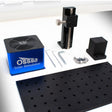
Modular Design
The modular design gives you the freedom to switch between an indoor PV or solar cell testing system, allowing for versatile and adaptable testing setups. This flexibility enables seamless transitions between different testing environments, enhancing efficiency and convenience.
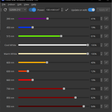
Easy-to-Use Software
Our free, downloadable software allows you to control the LED and set the indoor illumination level right for your needs. You can also control the lamp using a serial command library. This can be useful for specialist measurements and spectral output, including indoor PV measurement or low light intensity conditions.
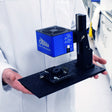
Adaptable Setup
With a very small footprint, the Ossila Indoor Simulator is perfect for busy laboratories. It can also be used in closer spaces where space is limited, such as a glove box* or in a laminar flow hood. Setup the system on any benchtop with the included optical breadboard, or attach the stand to a larger optical bench surface.
* Not for use in volatile environments.
Indoor Light Simulator Gallery
Software
The Ossila Solar Simulator Console enables you to control and customize the output of your LED solar simulator. You can choose the overall power level or control each LED individually to tailor the output to your specific requirements. The user-friendly software can be installed on as many PCs as you want and you can access future updates for free.

Software Requirements
| Operating System | Windows 11 (64-bit) |
|---|---|
| CPU | Dual Core 2 GHz |
| RAM | 4 GB |
| Available Hard Drive Space | 152 MB |
| Monitor Resolution | 1440 x 960 |
| Connectivity | USB |
In the Box
- LED Solar Simulator
- Indoor Light Filter
- USB Driver with calibration certificate & QC test data
- Optical Breadboard
- Adjustable Height Stand
Resources and Support
 Indoor Light Filter Installation
Indoor Light Filter Installation
This guide shows you how to attach the Ossila Indoor Light Filter to our solar simulator. Once the filter is attached, you are ready to start testing your indoor photovoltaic devices across two different indoor illumination levels.
Read more...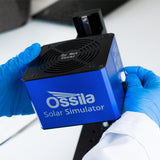 How to Set Up Your Indoor Light Simulator Light Source
How to Set Up Your Indoor Light Simulator Light Source
This guide shows you how to assemble the Ossila Indoor Light Simulator and Ossila Solar Simulator.
Read more...




